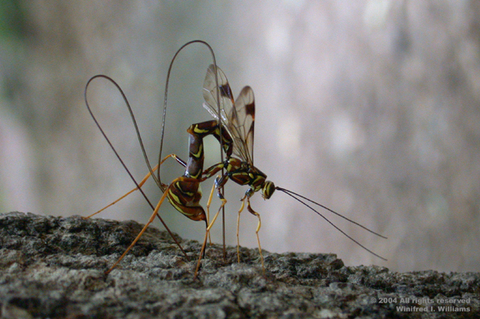Quick facts
- Megarhyssa is a large wasp found on declining or recently dead hardwood trees between May and July.
- It parasitizes horntails present in declining trees, but does not injure trees.
- Harmless to people and ignores people when possible.
- If mishandled, it may sting to protect itself.
How to identify ichneumonid wasps
Megarhyssa macrurus is a reddish brown and yellow insect with black coloring throughout. Another species, M. atrata is black with an orangish head.
- The body is 1.5 inches long. The ovipositor is 2-3 inches long. Total length of about 4 inches.
- The wasp has two protective sheaths that give the appearance that it has three 'tails'.
- It can be mistaken for other large-sized insects, like mayflies or dragonflies.
Biology
Ichneumonid wasps are parasitic to other insects.
- Megarhyssa is a parasite of horntails.
- Horntails attack dying or recently dead hardwoods, such as oak, maple, birch and elm.
- Megarhyssa can drill 1/2 inch or more into the wood with its ovipositor to deliver an egg into the horntail larva.
- Once the egg hatches, the Megarhyssa larva slowly feeds on the horntail, eventually killing it.
- After maturing, the adult wasp emerges from the tree.
- It might seem like the wasp is attacking the tree, but the wasp only feeds on the horntail.
Control
Although ichneumonid wasps appear dangerous due to their large size, they are not harmful to people.
- The wasp may jab with its ovipositor in self-defense. This will generally result only in a minor wound.
- Ignore these wasps, if you see them. They will go away on their own.
- It is not necessary to treat them with a pesticide.
Reviewed in 2024


